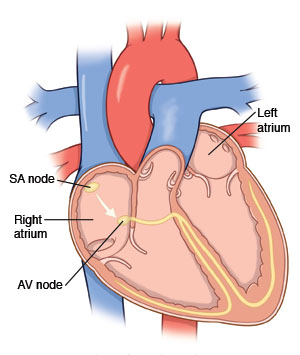Chemical Cardioversion

You had cardioversion today. In this procedure, a medicine was put into one of your veins. Or it was given to you to take by mouth (orally). This caused your heart to go back to a normal rhythm. In most cases, you should feel back to normal by the time you go home.
Home care
Follow these guidelines when caring for yourself at home:
-
You can go back to your usual activities once you feel back to normal.
-
Your healthcare provider may prescribe medicines to stop the abnormal heart rhythm from coming back. Take these medicines as directed. If you have certain rhythm problems such as atrial fibrillation or atrial flutter, you may need take blood thinners for at least 4 weeks after a cardioversion. If possible, don't schedule any surgeries or dental procedures during this time. This is so you won't have to stop taking the blood thinners. Stopping the medicines can raise your risk for stroke.
Follow-up care
Follow up with your healthcare provider, or as advised. You may need more testing. This might be an echocardiogram or event monitor. An event monitor checks your heart rhythm. Not all people with irregular heart rhythms have symptoms.
Call 911
Call 911 if you have:
-
Pain in your chest, arm, shoulder, neck, or upper back
-
Trouble breathing
-
You have problems speaking or seeing
-
Weakness in an arm or leg
-
You can move your arm or leg on 1 side of your body
-
Fainting
When to call your healthcare provider
Call your healthcare provider right away if any of these occur:
-
Weakness, dizziness, or lightheadedness
-
You feel like your heart is fluttering or beating fast, hard, or irregularly (palpitations)
Online Medical Reviewer:
Anne Clayton APRN
Online Medical Reviewer:
Stacey Wojcik MBA BSN RN
Online Medical Reviewer:
Steven Kang MD
Date Last Reviewed:
3/1/2022
© 2000-2024 The StayWell Company, LLC. All rights reserved. This information is not intended as a substitute for professional medical care. Always follow your healthcare professional's instructions.